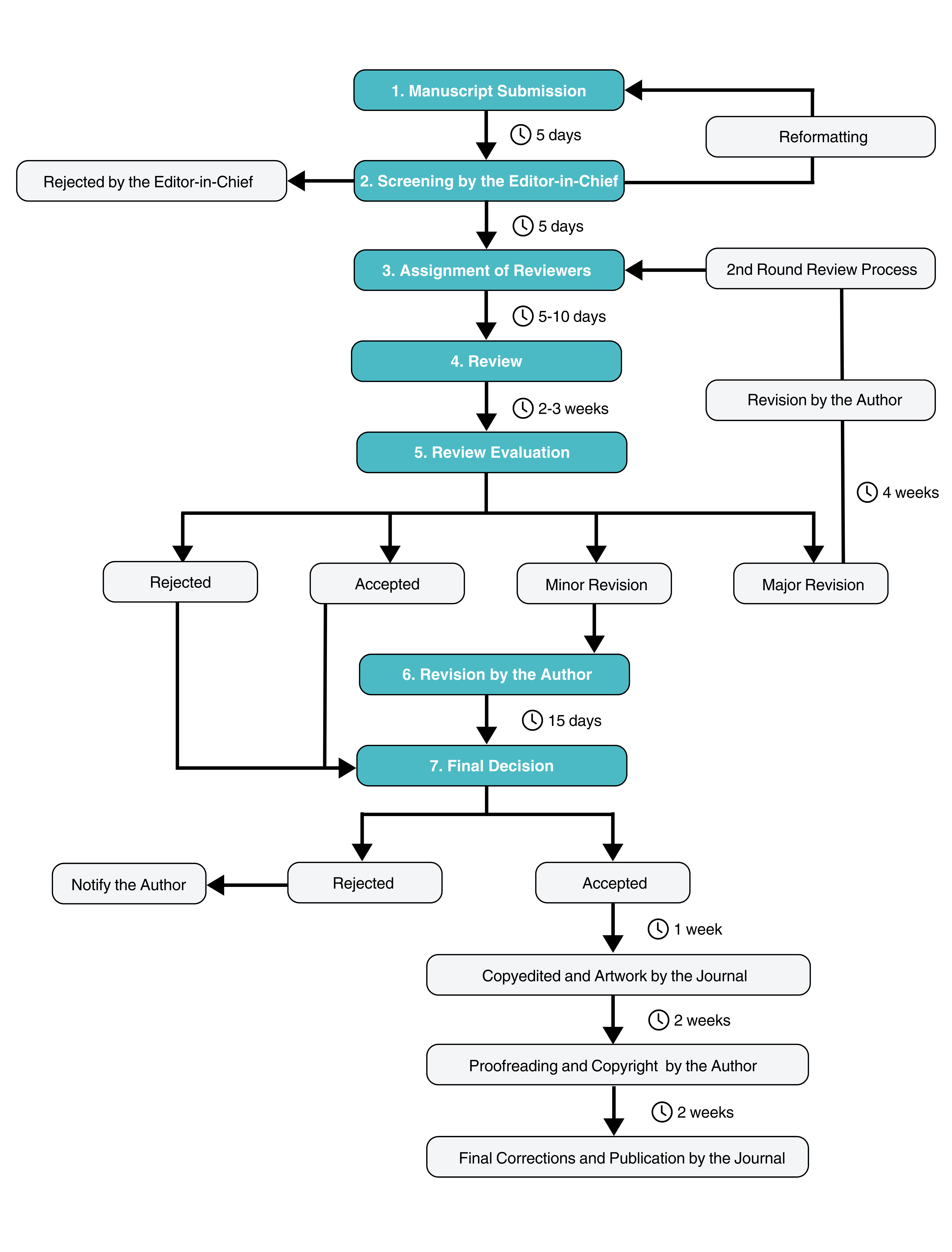Peer Review Process

Peer Review Process
The following steps are used to process all manuscripts submitted to Journal of Arts and Thai Studies (ARTS), with the entire process taking an average of about 4 months:
1. Manuscript Submission
The author submits a manuscript to ARTS via its ThaiJO online system exclusively. Using this designated online submission system ensures that the journal's editorial team properly receives, processes, and reviews the manuscript. This system streamlines the submission process and helps maintain the consistency and organization of submissions for efficient review and publication.
2. Screening by the Editor-in-Chief
All submissions to the journal undergo an initial review by the Editor-in-Chief and her associates. During this stage, manuscripts may be rejected without peer review if they fail to meet the journal's quality standards or if plagiarism is detected. This swift rejection process provides authors with a prompt decision, avoiding unnecessary delays. If the manuscript's content aligns with the journal's aims and scope but does not adhere to formatting requirements, the Editor-in-Chief will return it to the author for correction. Alternatively, the Editor-in-Chief may adjust the formatting to meet the journal's standards before re-entering it into the system.
This formatting review typically takes 5 days. Once the manuscript complies with the journal’s standards, it is forwarded to the journal manager for assignment to reviewers. If plagiarism is detected at the initial submission stage, the editors will address the issue with the author(s). For similarity percentages between 20% and 30%, the manuscript will be returned to the author(s) for clarification and necessary revisions before peer review. However, if the similarity exceeds 30%, the manuscript will be rejected outright.
3. Assignment of Reviewers
Manuscripts that are not instantly rejected are sent out for peer review, usually to three independent reviewers. The journal employs a double-blind peer review system: the author does not know the reviewers' identities, and the reviewers do not know the author's identity. Invited reviewers are generally unaffiliated with the author’s institution. The editor carefully selects reviewers with expertise in the subject matter. This process takes 5 to 10 days.
4. Review
ARTS provides a review form to all reviewers. Based on this form, reviewers evaluate the strengths and weaknesses of the manuscript and offer suggestions for improvement. Reviewers assess manuscripts based on the following criteria:
a) Contribution to existing knowledge.
b) Organization and readability.
c) Soundness of methodology.
d) Evidence supporting the conclusion.
e) Adequacy of the literature review.
Reviewers then recommend whether the manuscript should:
a) Be accepted without any changes.
b) Be accepted with minor revisions.
c) Require major revisions.
d) Be rejected.
Reviewers are given at least 2-3 weeks to complete their evaluations.
5. Review Evaluation
The editor evaluates the reviews and recommendations from the three reviewers, summarizes the results, and informs the authors. Manuscripts requiring minor revisions are given 15 days for adjustments, while those needing major revisions are allocated 4 weeks for corrections and resubmission. After resubmission, another 15 days are allocated for assessing the revised manuscript.
The final outcome of this evaluation determines whether the article is accepted or rejected for publication.
6. Revision by the Author
After receiving the review results, the author revises the manuscript according to the reviewers' suggestions. If any points are not addressed, the author must inform the Editor-in-Chief in writing. The revised manuscript must be submitted to the journal within 15 days. For major revisions, an additional 4 weeks may be granted.
7. Final Decision
Upon receiving the revised manuscript, the Editor-in-Chief reviews the revisions and makes a final decision regarding acceptance. Manuscripts that pass this stage proceed to reference editing and copy editing before publication.
During the decision-making process, the Editor-in-Chief typically takes one week to review the manuscript. Once accepted, the manuscript is sent for artwork creation, which usually takes about 2 weeks. The formatted manuscript is then returned to the author for verification of accuracy, also taking around a week. After necessary corrections, the article undergoes a final check before publication in the online journal system.
Publication Ethics and Malpractice Statement
ARTS is committed to upholding the highest standards of publication ethics and preventing any form of malpractice in its peer review process. We adhere to the following guidelines:
1. Confidentiality
The peer-review process is strictly confidential. All information related to submitted manuscripts is treated with the utmost confidentiality. Editors, reviewers, and all involved parties must refrain from disclosing any details about the manuscript or its review process.
2. Objectivity and Impartiality
Peer review is conducted objectively and without bias. Editors and reviewers evaluate manuscripts based on scientific merit, relevance, and quality, providing constructive feedback to authors to enhance their work.
3. Timeliness
ARTS ensures a timely peer review process. Editors and reviewers are expected to complete their reviews within a reasonable timeframe. Authors are kept informed of the manuscript’s status throughout the review process.
4. Transparency and Accountability
The peer review process is transparent and accountable. Reviewers provide clear, well-reasoned feedback, and editors make fair and informed decisions based on reviewers' comments and their expertise.
5. Conflict of Interest
Editors and reviewers must disclose any potential conflicts of interest that may compromise their objectivity. Appropriate measures are taken to ensure unbiased evaluation.
6. Research Integrity
Editors and reviewers are vigilant in identifying issues related to research integrity, such as data fabrication or other misconduct. Suspected misconduct is promptly reported to the relevant authorities.
7. Peer Reviewer Recognition
ARTS acknowledges the invaluable contributions of peer reviewers and provides appropriate recognition for their expertise and dedication to the publication process.
ARTS is committed to maintaining the integrity, credibility, and ethical conduct of the peer-review process, ensuring the high quality and trustworthiness of the research it publishes.

